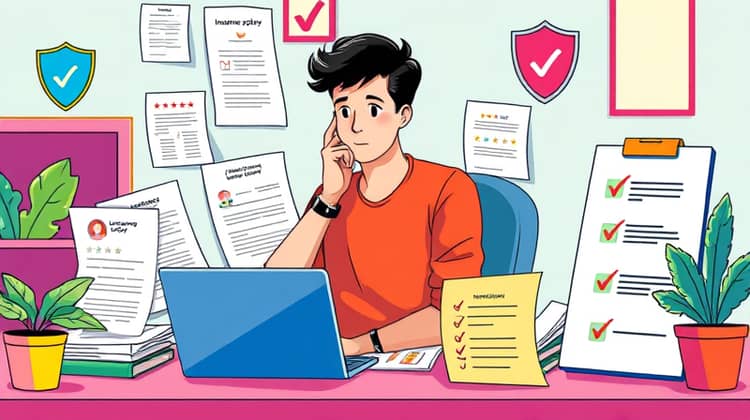Insurance Fraud: 6 Smart Tips to Protect Yourself

Insurance fraud is a significant issue affecting people and businesses alike. Every year, billions of dollars are lost due to fraudulent claims, scams, and other deceitful activities in the insurance industry. As a consumer, it's essential to be aware of these threats and take proactive steps to protect yourself from becoming a victim.
Understanding the common tactics used by fraudsters can help you identify suspicious behaviors and protect your personal and financial information. With the right knowledge and strategies in place, you can minimize your risk and navigate the insurance landscape safely.
This article will provide you with six smart tips to safeguard yourself against insurance fraud, ensuring you make informed decisions and protect your assets effectively. Let's dive into the details and see how you can arm yourself against fraud.
Understanding Insurance Fraud

Insurance fraud occurs when individuals or businesses deceive insurers to receive compensation or benefits they are not entitled to. This can take many forms, including exaggerating claims, submitting false claims, or staging accidents.
The consequences of insurance fraud are severe, not only for the victims but also for the insurance industry. It leads to higher premiums and can compromise the integrity of insurance companies. Understanding this can empower consumers to protect themselves and their interests.
1. Be Wary of Unsolicited Offers

Be cautious of any unsolicited offers you receive regarding insurance policies or services. Scammers often reach out to potential victims through phone calls, emails, or even social media, promising great deals or special offers that seem too good to be true.
These unsolicited approaches are often designed to pressure you into making quick decisions without fully understanding the terms and conditions, which can lead to falling victim to fraud. It's essential to approach such offers with skepticism.
- Ignore offers from unknown sources
- Research companies before engaging
- Always ask for written information
- Consult a professional if unsure
By being alert and doing your due diligence, you can avoid falling prey to fraudulent offers and safeguard your financial resources.
2. Verify Before You Buy

Before purchasing any insurance policy, take the time to verify the provider and their offerings. Many legitimate companies conduct thorough background checks, so it’s only fair you do the same with them.
Cross-verifying policies can save you from countless headaches and financial losses. Make sure the provider is licensed, has a solid reputation, and is a member of recognized industry associations.
- Check the issuer's licensing status
- Look for customer reviews and ratings
- Verify contact information
- Consult third-party resources for data
- Ask friends or family for recommendations
Taking these steps can help you make informed decisions and increase your confidence in the purchase you're making.
3. Guard Your Personal Information

Your personal information is valuable and can be appealing to fraudsters seeking to commit insurance fraud. It’s essential to protect your data diligently and only share it with trusted sources.
Regularly monitor the information you share with others and be mindful of unsolicited requests for personal details. Always verify the identity of the person requesting such information to prevent your details falling into the wrong hands.
- Avoid sharing sensitive data on public forums
- Use strong, unique passwords for accounts
- Be cautious about clicking links in emails
- Educate yourself on phishing tactics
By being protective of your personal data, you can significantly reduce your chances of becoming a target for insurance fraud.
4. Read the Fine Print

When entering an insurance agreement, it is crucial to read the fine print of any policy you consider. Many consumers overlook essential details that can lead to significant issues down the line.
Understanding the terms and conditions of your insurance policy is vital; it helps ensure you know precisely what is covered and what is not, ultimately protecting yourself from unpleasant surprises.
- Take notes on key policy details
- Ask questions about unclear terms
- Keep a copy of the policy for review
- Scout for hidden fees or conditions
- Understand the cancellation policy
By carefully examining the fine print, you equip yourself with the necessary knowledge to navigate potential problems related to fraud effectively.
5. Monitor Your Policies

After securing an insurance policy, it doesn't stop there—you should continue to monitor it regularly for any unusual activity. Regularly checking your statements can help you quickly identify discrepancies, such as unfamiliar claims or fines.
Anomalies may indicate fraudulent behavior or clerical errors that need to be addressed immediately.
- Review your insurance statements periodically
- Report any suspicious transactions instantly
- Contact your insurer for clarification
- Maintain a record of all communications
Being proactive in managing your policies can prevent you from becoming a victim of fraud and help maintain the integrity of your insurance coverage.
6. Trust Your Instincts

Sometimes, trusting your instincts can keep you out of trouble. If a deal feels wrong or seems too good to be true, it likely is. Pay close attention to your gut feelings when evaluating insurance offers or policies.
Fraudsters often employ pressure tactics to coerce decisions. If you feel rushed or uncomfortable, take a step back and reassess the situation before making any commitments.
- Seek a second opinion if unsure
- Don’t hesitate to ask for time to decide
- Avoid making hasty decisions
- Trust your research and knowledge
Your intuition is a powerful tool, and by combining it with informed decision-making, you can better navigate the complexities of the insurance landscape.
What to Do If You Suspect Fraud

If you suspect that you are a victim of insurance fraud, it’s crucial to act swiftly to mitigate any potential damage. Prompt action can help protect your interests and may allow you to recover any losses.
- Gather all relevant information regarding the suspected fraud
- Report the issue to your insurance company
- Contact local authorities or fraud hotline
- Keep records of all communications about the fraud
- Consider seeking legal advice if necessary
Taking these steps seriously can help you respond effectively to suspected fraud, ensuring that you safeguard your interests and cooperate with law enforcement to prevent further issues.






